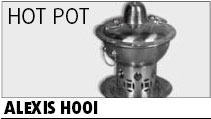Coming to a land of milk for money
By Alexis Hooi ( China Daily ) Updated: 2007-11-06 07:09:16It has been awhile since I drank so much milk. The last time I remember, it was in primary school back in Singapore when pupils were made to down a pack of the liquid every day during recess. I recall that noble effort of a nascent nation to boost the diet of its children in a diluted, bland and artificially flavored way.

Fast-forward to two decades later in Beijing, now I cannot get enough of the stuff. Shopping from the vast array of milk and dairy products in the local grocery store can be a weekend treat alone.
Household names such as Yili and Mengniu dominate at least three other Chinese brands to parade calcium-fortified, low-fat and whole milk varieties, piled head high and packaged on the Olympics bandwagon fronted by fresh-faced actresses and popular athletes. Yogurt comes in tropical fruit-flavored choices, while kids and their parents step out into the cold clutching wickedly irresistible popsicles.
There is even a high-end version of milk available for no less than 4 yuan (53 US cents) a 250 ml pack, with a taste that is simply sublime.
Chinese Premier Wen Jiabao said famously that he has a dream - to provide every child in the country with a jin or 500 grams of milk a day.
Not that equating development with the availability of milk is new. In Germany, many consider it to be akin to a constitutional right that children have access to an affordable glass of milk. While Chinese still consume about a fifth of the world's milk and dairy products every year compared with, for example, the Germans, the country is certainly moving up the "milk index".
This newspaper recently reported that last year, the industry churned out more than 33 million tons of raw milk and dairy products, 3.6 times more than six years before (year 2000), with annual growth at about 24 percent. City dwellers last year lapped up 25.54 kilograms of dairy products each, up 76.6 percent from seven years ago (year 2000), while the dairy consumption in rural areas tripled to 3 kilograms in the same period. All this against an industry already said to be worth more than $10 billion just two years ago. To be sure, the figures show there is some way to go for a country of more than 1.3 billion. For one thing, expanding the school milk program would immediately benefit students and suppliers alike.
Further up the ladder, soy-based products continue instead to characterize what some developed countries have substituted for milk to get their protein - offering what is said to be additional fat-busting, anti-heart disease and cancer-fighting properties.
And purists maintain that small amounts of breast milk provide babies with important nutritional and immunological properties not found in infant formula.
In the United States, some have even gone full circle to slurping the raw, unpasteurized, unhomogenized product straight from cows.
Meanwhile, the plastic mug I bought from the store quaintly designed for holding milk is running dry. Perhaps when I go for more supplies, I'll check out the beer shelf, too.
(China Daily 11/06/2007 page20)
|
|
|
|
|
|
|
|


























 Raymond Zhou:
Raymond Zhou: Pauline D Loh:
Pauline D Loh: Hot Pot
Hot Pot Eco China
Eco China China Dream
China Dream China Face
China Face






